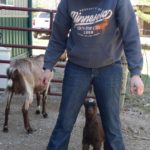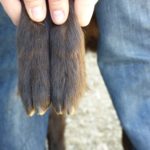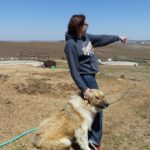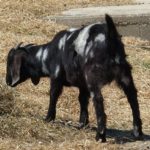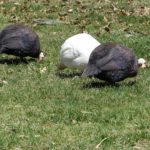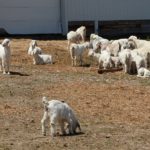A Visit to Cheshire Moon Farm
Fans of Alice and Wonderland know the famous Cheshire Cat grin. That feline gave its name to a happy place called Cheshire Moon Farm in rural Atkins, Iowa. Winding Pathways visited in late April and left smiling.
The farm is perched on high ground with a clear view in all directions. “The night sky is gorgeous and the crescent moon reminded me of the Cheshire Cat’s grin, so that’s how our place got its name,” said Elise Gallet de St Aurin.
Happy Animals Reflect Caretakers’ Enthusiasm
The name is appropriate. Elise and her family are caretakers of goats, sheep, horses, guineas, chickens, and a couple of dogs. As she led us around, her cheery enthusiasm was matched by that of the animals. All seemed happy, and if the animals could grin like the Cheshire cat we’re sure they would.
- A great smile
- Elise Holds Goat
- Goats follow Elise around.
- Goathooves
Elise holds a master’s degree in agriculture education and chose to return to the family farm after college, where she meshed her considerable energy with enthusiasm and knowledge to build a business centered mostly around goats.
How Goats Help People
There are lots of goats at Cheshire Moon Farm. Some are meat breeds sold for the niche meat market. Other goats are kept for breeding. And, at least one semi-retired animal mentors the herd of younger goats. Still, others are milkers that produce the raw material for the soaps and lotions that Elise makes. Although not approved by the Food and Drug Administration (FDA) for people who suffer from eczema and psoriasis, Elise indicated that some customers find the products helpful.
Thanks to Elise we received a goat education. They are truly amazing and were the first animal domesticated by people some 30,000 years ago in the Middle East. A goat can yield about 45 pounds of meat and a milker may yield up to a gallon a day. Some people enjoy having a goat pet, which has a lifespan similar to that of a dog. Goats live in herds. Sheep in flocks.
There are many goat breeds, and the animals come in many colors and configurations. One goat Elise calls her reverse Dalmatian because of its black body with white spots.
Goats are curious, love to climb on things and are voracious eaters. “They love snacking on woody plants and like poison ivy, Canada thistle, and other prickly plants. In contrast, sheep are grazers that prefer to eat grass,” she said.
- Elise Points
- Spotted Goat
- Guineas eat ticks.
- All sorts of goats.
Landowners hire her to bring goats to places loaded with exotic undesirable prickly plants. In a short time, the animals devour honeysuckles, barberries, and poison ivy. We asked how she cleans the poison-ivy-eating-goats off. “I mix Dawn soap with water and squirt them down until they turn blue, then hose them off,” she explained.
A Woman on a Mission
In addition to raising goats for brush clearing, milk, and meat Elise, is a farrier who travels to trim the hooves of sheep and goats and had just returned from a Minnesota hoof trimming trip when we met her. She works full time at the Cedar Rapids Tractor Supply Company. Among many duties at the store, she manages baby chick sales.
Despite her vast knowledge of animals, what shines through is her boundless enthusiasm for education, augmented by her master’s degree in that field. She’s also an adept cooperator. “I don’t know machines too well but teamed up with Larry’s Landscaping to fill voids in the farm operation,” she said. While we visited, Larry and two of his children were buzzing around tidying up the property for an upcoming open house.
As we left for home we glanced back at Cheshire Moon Farm. Goats, sheep, chickens, guineas, and horses all seem to give us a big happy grin as if to say, “Hurry back”.
We’ll do that. Anyone is welcome to an Open House from 10 a.m. to 3 p.m. on Saturday, May 19, 2018.
3169 74th St Atkins, IA 52206. 1-319-929-5201.CLG.CONSULTANTS.INC@gmail.com. For information check out CGLHEARTANDHOOVES.COM.



